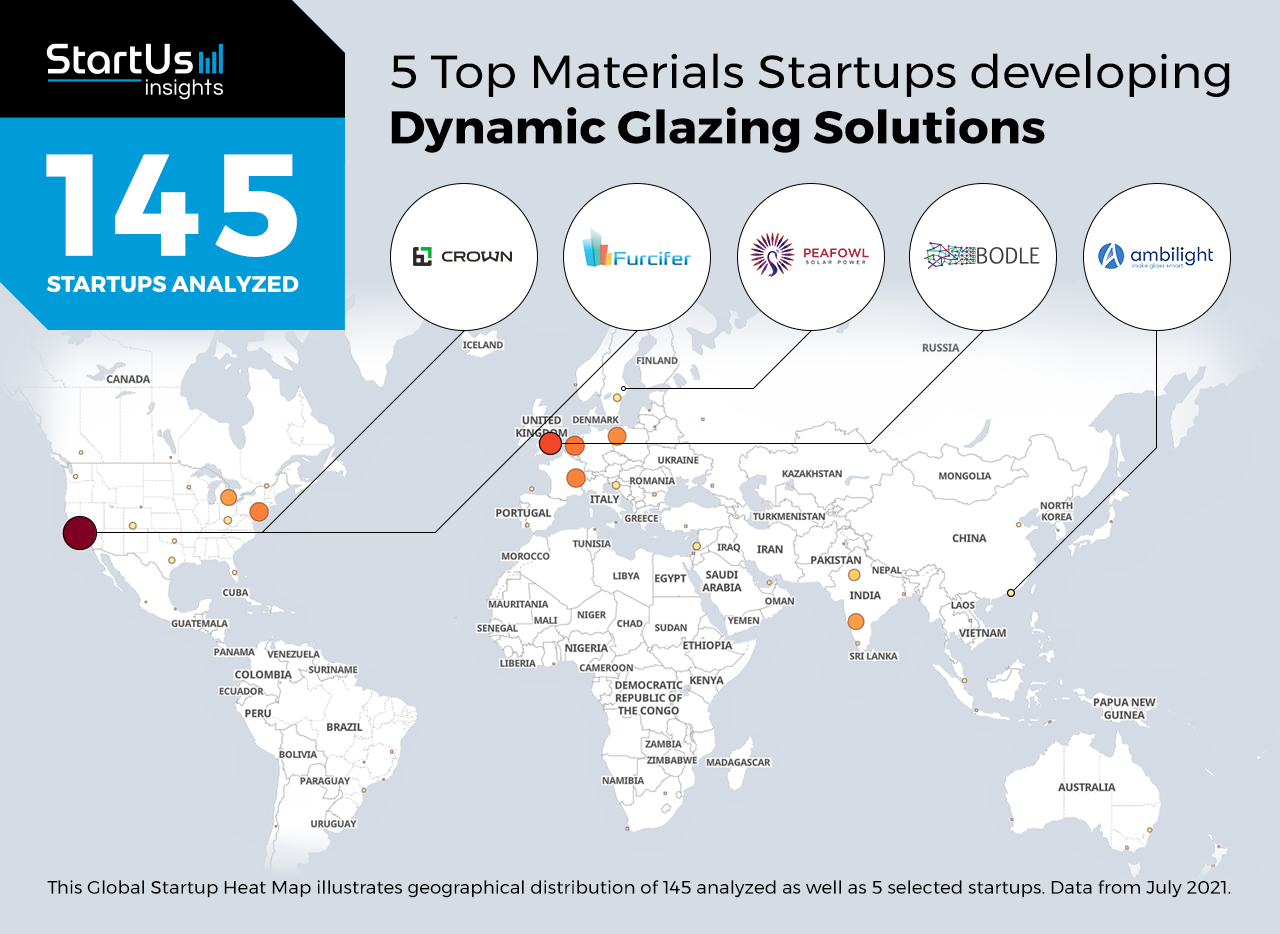Staying ahead of the technology curve means strengthening your competitive advantage. That is why we give you data-driven innovation insights into the materials industry. This time, you get to discover 5 hand-picked dynamic glazing solutions.
Global Startup Heat Map highlights 5 Top Dynamic Glazing Solutions out of 145
The insights of this data-driven analysis are derived from the Big Data & Artificial Intelligence-powered StartUs Insights Discovery Platform, covering 2.093.000+ startups & scaleups globally. The platform gives you an exhaustive overview of emerging technologies & relevant startups within a specific field in just a few clicks.
The Global Startup Heat Map below reveals the distribution of the 145 exemplary startups & scaleups we analyzed for this research. Further, it highlights 5 materials startups that we hand-picked based on criteria such as founding year, location, funding raised, and more. You get to explore the solutions of these 5 startups & scaleups in this report. For insights on the other 140 dynamic glazing solutions, get in touch.
Furcifer manufactures Electrochromic Films
Direct sunlight entering a room through the glass fades furniture coatings, increases the temperature inside, and causes glare on electronic devices. However, the application of electrochromic film to the glass eliminates the negative impact of sunlight and blocks ultraviolet (UV) light. To this avail, startups advance electrochromic film properties for dynamic glazing applications.
US-based startup Furcifer manufactures flexible electrochromic films. The startup utilizes wet-processable solid polymer materials in a high-speed low-cost roll-to-roll printing process for flexible film production. Furcifer’s technology enables the application of dynamic glazing in the architecture and automotive industries, as well as for display production.
Crown Electrokinetics creates Retrofit Dynamic Films
Replacing the existing glazing with dynamic glass, regardless of the benefits, is an extremely costly and wasteful activity. Therefore, startups and emerging companies develop film solutions that retrofit the existing glazing installations. This allows organizations and households to optimize the lighting quality and temperature without the need to purchase new windows.
US-based startup Crown Electrokinetics upgrades the existing glazing with dynamic film solutions. The startup’s product, DynamicTint, leverages electrokinetic technology to tint the glass in several seconds, utilizing a minimal amount of energy. Using the technology, Crown Electrokinetics retrofits commercial and residential buildings, vehicle windows, and sunroofs, as well as finds applications in the aerospace and maritime industries.
Ambilight offers Smart Glass for Automotive Applications
The temperature inside a vehicle parked in the open sunlight reaches well beyond 40 degrees Celsius. To reduce vehicle heating and improve the resulting driving comfort, startups develop dynamic glazing solutions for the automotive industry. Additionally, such solutions remove the glare from headlights reflected in rearview mirrors, which limits the driver’s visibility when traveling at night.
Chinese startup Ambilight develops smart glass solutions for automotive industry applications. The startup utilizes the flexible electrochromic dynamic film technology, which improves control over the material, increasing the range of use-cases. Ambilight applies dynamic glazing to side windows, sunroofs, and rearview mirrors to improve driving comfort and prevent the cabin from overheating. The startup also develops smart glass solutions for architecture and ski goggles applications.
Peafowl Solar Power enables Dynamic Electrochromic Windows
However small, the electrochromic technology still requires some adequate power supply. The inconvenience of connecting windows to the power grid impacts the speed of dynamic glazing adoption. To mitigate this issue, startups develop compact solar cells, which eliminate the need to install extra wiring to enhance windows with shading capabilities.
Swedish startup Peafowl Solar Power develops transparent solar cells for dynamic windows. The startup’s cells use plasmonic nanoparticles as the active photovoltaic material, which increases their light absorption and improves efficiency as a result. The application of Peafowl Solar Power’s cells to dynamic glass increases their sustainability and enables retrofitting of existing windows.
Bodle Technologies develops Reflective Displays
The dynamic glazing technologies find few applications beyond architecture and automotive due to relatively slow switching speeds. However, the use of low-dimensional phase change materials enables the wider application of optoelectronic solutions. In particular, startups work on reflective displays for wearables, Internet of Things (IoT) devices, and augmented reality (AR) glasses, among other solutions.
British startup Bodle Technologies works on reflective display and dynamic glazing technologies. The startup’s Solid-State Reflective Displays (SRD) leverage ultra-thin film capable of generating color sub-pixels for a full-color display. Using minimal power, the Bodle SRD solution finds applications in eReaders, smartphones, and in-window information displays.
Discover more Materials Startups
Materials startups such as the examples highlighted in this report focus on silica, alumina, and coating solutions. While all of these technologies play a major role in advancing the materials industry, they only represent the tip of the iceberg. To explore more materials technologies, simply get in touch to let us look into your areas of interest. For a more general overview, you can download our free Materials Innovation Report to save your time and improve strategic decision-making.










